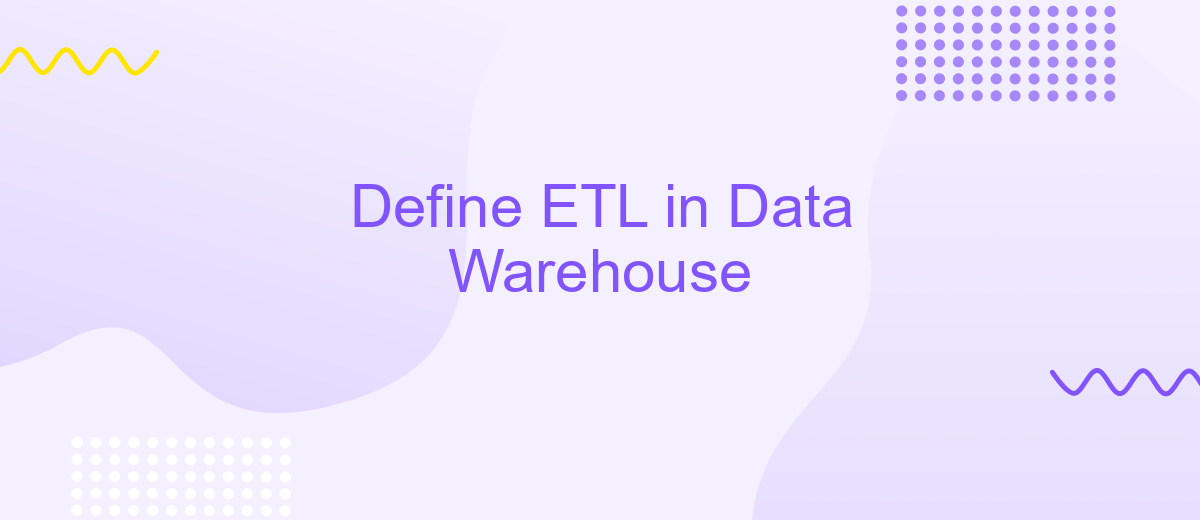Define ETL in Data Warehouse
Extract, Transform, Load (ETL) is a crucial process in data warehousing that involves extracting data from various sources, transforming it into a suitable format, and loading it into a data warehouse for analysis. This process ensures that data is accurate, consistent, and ready for business intelligence activities, enabling organizations to make informed decisions based on comprehensive data insights.
Introduction
In the realm of data management, Extract, Transform, Load (ETL) processes are fundamental to the functioning of a data warehouse. ETL is a series of steps designed to extract data from various sources, transform it into a suitable format, and load it into a data warehouse for analysis and reporting. This process ensures that data is accurate, consistent, and accessible for decision-making purposes.
- Extract: This step involves retrieving raw data from multiple sources such as databases, APIs, and flat files.
- Transform: During transformation, the extracted data is cleaned, enriched, and formatted to meet specific requirements.
- Load: The final step is loading the transformed data into the data warehouse, where it can be queried and analyzed.
Modern ETL tools and services, like ApiX-Drive, simplify the integration process by offering automated workflows and real-time data synchronization. These tools help organizations streamline their data management practices, ensuring that data from disparate sources is seamlessly integrated into the data warehouse, ready for analysis and insights.
What is ETL?

ETL stands for Extract, Transform, Load, and it is a crucial process in data warehousing. The process begins with extracting data from various sources, such as databases, APIs, or flat files. This raw data is often unstructured and requires cleaning and organization. The transformation phase involves converting the extracted data into a suitable format or structure for analysis. This may include data cleansing, aggregation, and enrichment to ensure consistency and accuracy.
The final step, loading, involves transferring the transformed data into a data warehouse or another target system where it can be used for reporting and analytics. Efficient ETL processes are essential for maintaining data integrity and enabling timely insights. Tools like ApiX-Drive can simplify the integration and automation of ETL processes, allowing organizations to connect various data sources effortlessly and streamline their data workflows.
ETL Processes

ETL, which stands for Extract, Transform, Load, is a crucial process in data warehousing that involves extracting data from various sources, transforming it into a suitable format, and loading it into a data warehouse. This process ensures that the data is clean, consistent, and ready for analysis.
- Extract: Data is collected from different sources such as databases, APIs, and flat files. Tools like ApiX-Drive can facilitate this by automating the extraction process from various integrated platforms.
- Transform: The extracted data is then transformed to fit the data warehouse schema. This step involves data cleaning, normalization, and aggregation to ensure quality and consistency.
- Load: Finally, the transformed data is loaded into the data warehouse. This can be done in batches or in real-time, depending on the requirements and the tools used.
Effective ETL processes are essential for maintaining the integrity and usability of the data within a data warehouse. Services like ApiX-Drive can streamline these processes by providing seamless integration and automation, thereby reducing manual effort and errors.
Benefits of ETL

ETL (Extract, Transform, Load) processes are crucial in data warehousing, providing numerous benefits that enhance data management and utilization. By automating data extraction from various sources, ETL ensures that data is consistently updated and readily available for analysis.
One significant advantage of ETL is its ability to transform raw data into a structured format, making it easier to analyze and interpret. This transformation process includes cleaning, filtering, and aggregating data, which improves data quality and reliability.
- Improved Data Quality: ETL processes clean and standardize data, reducing errors and inconsistencies.
- Enhanced Data Integration: ETL allows seamless integration of data from multiple sources, providing a unified view.
- Time Efficiency: Automation in ETL saves time by processing large volumes of data quickly and accurately.
- Scalability: ETL systems can handle increasing volumes of data, making them suitable for growing businesses.
Services like ApiX-Drive facilitate ETL processes by offering tools to automate data integration and transformation. These services help businesses streamline their data workflows, ensuring that accurate and up-to-date data is always available for decision-making. By leveraging ETL, organizations can make more informed decisions, drive efficiencies, and gain a competitive edge.
- Automate the work of an online store or landing
- Empower through integration
- Don't spend money on programmers and integrators
- Save time by automating routine tasks
Conclusion
In conclusion, ETL (Extract, Transform, Load) processes play a crucial role in the efficient functioning of data warehouses. By systematically extracting data from various sources, transforming it into a suitable format, and loading it into the data warehouse, ETL ensures that organizations have access to clean, consistent, and reliable data for analysis and decision-making. This streamlined approach not only enhances data quality but also enables businesses to derive valuable insights and drive strategic initiatives.
To further optimize ETL processes and integration efforts, leveraging tools like ApiX-Drive can be highly beneficial. ApiX-Drive simplifies the integration of various applications and services, facilitating seamless data transfer and synchronization. By automating these tasks, businesses can save time, reduce errors, and ensure that their data warehouse is consistently updated with the latest information. Ultimately, embracing robust ETL practices and utilizing advanced integration tools can significantly enhance the overall efficiency and effectiveness of a data warehouse.
FAQ
What is ETL in the context of Data Warehousing?
Why is ETL important for Data Warehousing?
What are the main stages of the ETL process?
How can automation be integrated into the ETL process?
What challenges might one face during the ETL process?
Do you want to achieve your goals in business, career and life faster and better? Do it with ApiX-Drive – a tool that will remove a significant part of the routine from workflows and free up additional time to achieve your goals. Test the capabilities of Apix-Drive for free – see for yourself the effectiveness of the tool.


